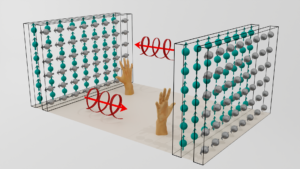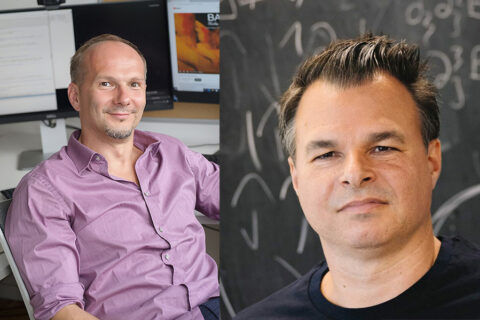Reflections without mirroring
Physicists at MPL and FAU develop novel concept for detecting chiral molecules
In contrast to conventional mirrors, light can be reflected on surfaces known as meta surfaces without changing its polarization. This has now been proven by physicists at Friedrich-Alexander-Universität Erlangen-Nürnberg (FAU) and the Max Planck Institute for the Science of Light (MPL). This enables circulating light to be used to reliably detect chiral molecules. The researchers have published their discovery in the journal Physical Review Letters.
Chiral molecules occur frequently in nature. Known as enantiomers, they are mirrored twins – like the right and left hands of humans. “Enantiomers usually have the same function,” says Dr. Michael Reitz, who gained his doctoral degree in 2023 in the research group at MPL led by Dr. Claudiu Genes. “However, they can have completely different effects, especially when they come into contact with other chiral molecules.” This can have a serious impact, for example in pharmacology. Whereas one of the enantiomers might provide the cure for a certain disease, the other could be harmful to the body.
The ability to precisely detect and distinguish chiral molecules is thus of particular interest, not only in pharmacological research. Light is an ideal candidate for research as photons themselves can also be chiral. “It is possible to generate light as a spiral in a corkscrew shape,” explains Nico Bassler, joint doctoral candidate of Claudiu Genes, head of the independent research group “Cooperative Quantum Phenomena” at MPL and Prof. Dr. Kai Phillip Schmidt, Chair of Theoretical Physics V at FAU. “Depending on the direction in which the spiral turns, it interacts either with left-handed or with right-handed enantiomers.” To maximize this interaction however, the light field must be spatially confined, for example by circulating it between two mirrors. The problem here is that when light is reflected using a conventional mirror, it changes its polarization — the spiral then rotates in the opposite direction and would interact with the “wrong” enantiomer.

Double layers of atoms used as a mirror
Physicists at FAU and MPL solved this problem with a novel concept: Instead of using conventional mirrors, they use something known as meta surfaces comprised of double layers of atoms. “We combine two single-layer stacks of atoms that each possess electrical dipole moments,” explains Claudiu Genes. “Dipole moments can be regarded as the charge direction along an axis.” The decisive factor for the function of meta surfaces is the orthogonal orientation of the stacks of atoms, that is, ensuring that they are at 90 degrees to each other. “This trick from the field of quantum physics means that the photons are reflected, but still maintain their polarization,” explains Prof. Dr. Kai Phillip Schmidt.
This allows for a completely new type of chiral sensor: While enclosed between two meta surfaces in a very small space, circulating light can detect chiral molecules reliably and with extremely high sensitivity. The researchers expect their discovery will help to speed up the development process for materials with relevant functions, particularly in the fields of biochemistry and pharmacy.
Project combines solid state physics and quantum optics
This work was carried out within the collaborative research center TRR306 QuCoLiMa (Quantum Cooperativity of Light and Matter) and as a collaboration between the research teams of Prof. Dr. Kai Phillip Schmidt at FAU and Dr. Claudiu Genes at the MPL, successfully bringing together expertise in solid state physics and quantum optics. The project was carried out by joint doctoral candidate Nico Bassler and supervised by Dr. Michael Reitz, who gained his doctoral degree in 2023 in the research group led by Genes and who is currently completing a postdoctoral scholarship at the University of California San Diego, USA. Dr. Andrea Aiello, who is an expert for the chirality of light at MPL, also made a significant contribution to the project.
Friedrich-Alexander-Universität Erlangen-Nürnberg
Friedrich-Alexander-Universität Erlangen-Nürnberg (FAU), established in 1743, is one of the largest universities in Germany, with roughly 40,000 students, over 600 professors and around 16,000 members of staff. At present, FAU is leading or contributing more than 100 projects funded by the German Research Foundation (DFG). FAU offers around 270 degree programmes, including nine Bavarian Elite Master’s degree programmes and around 50 programmes with a distinct international focus. No other German university offers such a broad and interdisciplinary range of subjects on all qualification levels. FAU students enjoy global mobility thanks to partnerships with higher education institutions throughout the world.
Max-Planck-Institut für die Physik des Lichts
Research at the Max Planck Institute for the Science of Light (MPL) covers a wide range of topics, including nonlinear optics, quantum optics, nanophotonics, photonic crystal fibres, optomechanics, quantum technologies, biophysics, and – in collaboration with the Max-Planck-Zentrum für Physik und Medizin – links between physics and medicine. MPL was founded in 2009 and is one of the over 80 institutes that make up the Max Planck Society, whose mission is to conduct basic research in the service of the general public in the natural sciences, life sciences, social sciences and the humanities.
Further information
DOI: 10.1103/PhysRevLett.132.043602 “Metasurface-based hybrid optical cavities for chiral sensing”
Dr. Claudiu Genes
Max Planck Institute for the Science of Light (MPL)
claudiu.genes@mpl.mpg.de
Prof. Dr. Kai Phillip Schmidt
Department of Physics
kai.phillip.schmidt@fau.de
